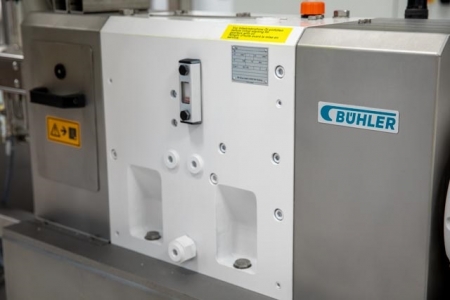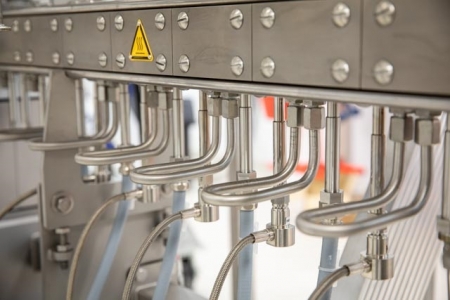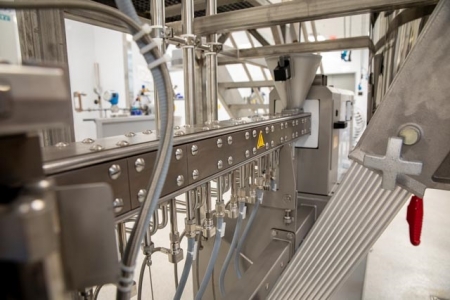Equipment Spotlight: Bühler Extruder

Exciting opportunities happen every day at the NC Food Innovation Lab. But our most exciting activity of late has been the installation and upcoming training and commissioning of our Bühler BCTM 30/36 D Extruder.
As you may well know, this machine’s functionality is impressive, and it is in high-demand, reliably scheduled out in existing facilities for several months.
And that’s why we cannot wait to welcome clients to use our extruder, starting this summer.
Perfect Partner to Plant-Based Foods
Why is the acquisition and installation of this machine so exciting? The recent growth in plant-based foods, especially meat alternatives, has quickly driven interest in this form of processing, but there’s only a very limited number of machines available in pilot plants that companies can access for product development work. Therefore, the machines are in high demand, with five to six months’ wait in some instances.

“With the rapid increase of investment and product development in the plant-based space, line time at innovation centers is at a premium,” said Dave Reynolds, Bühler’s Sales & Development Business Manager in Alternative Protein Solutions & Ingredients. “NCFIL’s capacity and capabilities will allow more companies to develop new products and bring them to market quickly, which enables them to better utilize their R&D budget.”
Very few universities have an extruder, and even fewer with a cooling die like this one, so NCFIL’s machine is in a fairly exclusive class. NCFIL Executive Director Dr. Bill Aimutis predicts, “In the first few years, use of the extruder will focus on meat and dairy alternatives, bioindustrial products, and microencapsulated flavors.”
Why This Extruder?
One reason NCFIL selected this Bühler extruder is because it can produce a quantity of product that an entrepreneur or product developer can easily work with, for example, hundreds of pounds per day versus thousands of pounds per day produced by larger machines. Another advantage is processing conditions optimized in this extruder are almost always translational to use in larger extruders. A machine smaller than 30 mm diameter will not scale up well when transitioning to a larger machine, forcing the user to reestablish processing conditions.
The commissioning of the Bühler extruder at NCFIL is scheduled for May 27, and the hope is to put it in service very soon thereafter. What does commissioning mean? It means we’ve completed all connections, fired up and conducted continual runs on the machine, and ensured it works properly under different conditions. A Bühler representative will be on-site to commission and train the NCFIL team the week of May 27.
Who Uses the Extruder?
The Bühler extruder serves clients in the early stages of developing new products requiring extrusion as well as clients who’ve made previous pilot plant runs at a competitor or extruder manufacturer. Most often, food entrepreneurs and multinational food companies who want to enter or expand product offerings in the plant-based, extruded product space will make up NCFIL’s clients.

“It is clear that plant-based meat alternatives are in very high demand,” said Reynolds. “NCFIL’s extrusion capabilities will expedite scale up for start-ups needing assistance with product development and help get these new products into the market faster.”
NCFIL’s Bühler extruder and its accessories will be good for the following food categories:
- Expanded snack foods, like cheese curls, corn chips, and ready-to-eat breakfast cereals
- Texturized vegetable protein, precursors to many of today’s plant-based meat alternatives
- Ingredients that go into products, as opposed to finished food
- High-moisture meat alternatives, like chicken nuggets, jerky and meat crumbles
- Microencapsulated flavors, flavors coated with a hard shell, prolonging flavor intensity and protecting flavor from heat
- Potentially dairy alternatives and specialty proteins in the future
We also anticipate interest from bioindustrial customers. These companies utilize waste products from the food manufacturing industry and turn it into another edible food/ingredient or utilize it as a precursor for the chemical production that goes into paper coatings, adhesives or biodegradable plastics.
How Does the Extruder Work?
Reynolds defines what the extruder is designed to do: “This pilot extruder is designed for processing the wet textrudate (High Moisture), plant-based meat analog products, but also has the flexibility to be used for a wide variety of dry textrudate (TVP), extruded snacks, feed and other upcycled products.”
Here’s a breakdown of how the Bühler extruder works:
- The extruder contains two shafts with elements; the elements look like threads on a bolt. The elements mesh together; there is some small tolerance between them.
- The product in powder form is forced in the space between the two elements; the powder is then mixed with water and compounds are stretched. Stretching the protein creates a texture similar to meat strands.
- The protein is forced into the cooling die, which is an oblong chamber, in which the proteins gel, locking themselves together to form a textured meat piece. The finished shape exiting the cooling die then has the appearance of a chicken strip.
- Once the protein comes out of the cooling die, a cutter custom cuts the piece in nuggets or crumbles.
Extruder Excitement Builds
Meat alternatives and novel plant-based proteins have captured recent headlines, and the Bühler extruder definitely serves the growth of this current food innovation. The popularity of and investment in meat alternatives and plant-based proteins is projected to grow over the next decade to help feed a growing global population and to help seek ways to protect the environment.
Many companies already use extrusion, like Improved Nature. Now, household names Beyond Meat and Impossible Foods are also starting to use extrusion.
The Pay-Off Is Real…
It’s apparent that many in the food industry will benefit when NCFIL’s Bühler extruder comes online.
Reynolds explains, “Start-ups, investors, retailers, and even large multinational companies are open to working with innovation centers like NCFIL to gain access to their food industry experts and resources. NCFIL helps customers avoid common product development and scale-up pitfalls, and the flexible capabilities of the pilot equipment, plus not having to purchase a lab or hire an internal staff, reduces the company’s R&D expenses.”
And the Possibilites Are Endless
Twin screw extruders have been around for decades, but their use beyond companion animal and livestock feeds is only now being recognized. With other new technologies being practiced, such as 3D printing, artificial intelligence, and machine learning, the possibilities for extrusion technology will continue to expand.
“NCFIL will utilize this equipment predominantly with customers, but will also conduct research that will lead to innovative technologies, stretching current capabilities,” says Aimutis. “Our formulated ideas are confidential as significant findings will lead to NCFIL developing an intellectual property portfolio with technologies available for licensing.”
- Categories: